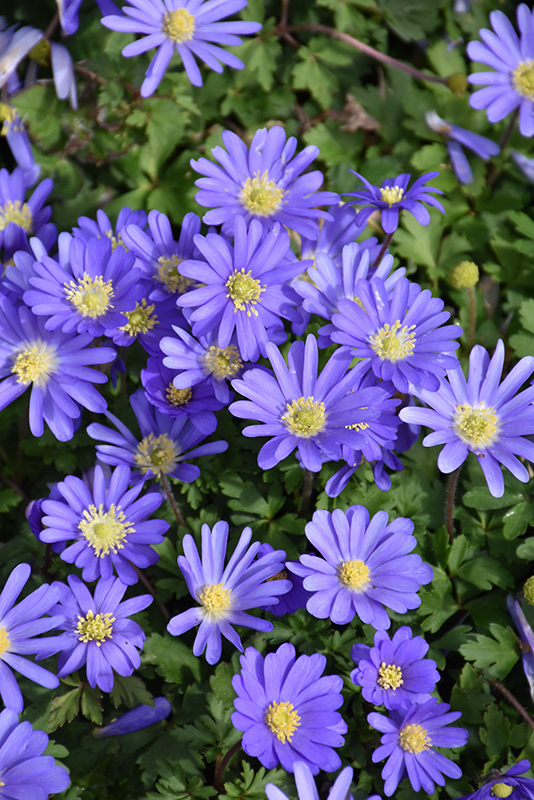Blue Star Windflower*
Anemone blanda 'Blue Star'
* This is a "special order" plant - contact store for details
Plant Height: 6 inches
Flower Height: 9 inches
Spread: 6 inches
Sunlight:
![]()
![]()
Hardiness Zone: 4
Other Names: Grecian Windflower, Winter Windflower
Description:
This variety produces a lovely, low growing mat of intense blue daisy flowers in spring, when little else blooms; attractive, finely cut leaves disappear soon after flowering; requires dry dormancy after blooming and prefers sandy soil
Ornamental Features
Blue Star Windflower has masses of beautiful blue daisy flowers with violet overtones and buttery yellow eyes at the ends of the stems from early to mid spring, which are most effective when planted in groupings. Its deeply cut ferny leaves remain emerald green in colour throughout the season.
Landscape Attributes
Blue Star Windflower is a dense herbaceous perennial with a ground-hugging habit of growth. Its relatively fine texture sets it apart from other garden plants with less refined foliage.
This is a relatively low maintenance plant, and should be cut back in late fall in preparation for winter. Deer don't particularly care for this plant and will usually leave it alone in favor of tastier treats. It has no significant negative characteristics.
Blue Star Windflower is recommended for the following landscape applications;
- Mass Planting
- General Garden Use
- Naturalizing And Woodland Gardens
Planting & Growing
Blue Star Windflower will grow to be only 6 inches tall at maturity extending to 9 inches tall with the flowers, with a spread of 6 inches. Its foliage tends to remain low and dense right to the ground. It grows at a medium rate, and under ideal conditions can be expected to live for approximately 10 years. As an herbaceous perennial, this plant will usually die back to the crown each winter, and will regrow from the base each spring. Be careful not to disturb the crown in late winter when it may not be readily seen! As this plant tends to go dormant in summer, it is best interplanted with late-season bloomers to hide the dying foliage.
This plant does best in full sun to partial shade. It prefers to grow in average to moist conditions, and shouldn't be allowed to dry out. It is not particular as to soil pH, but grows best in sandy soils. It is somewhat tolerant of urban pollution. This is a selected variety of a species not originally from North America. It can be propagated by division; however, as a cultivated variety, be aware that it may be subject to certain restrictions or prohibitions on propagation.
* This is a "special order" plant - contact store for details







